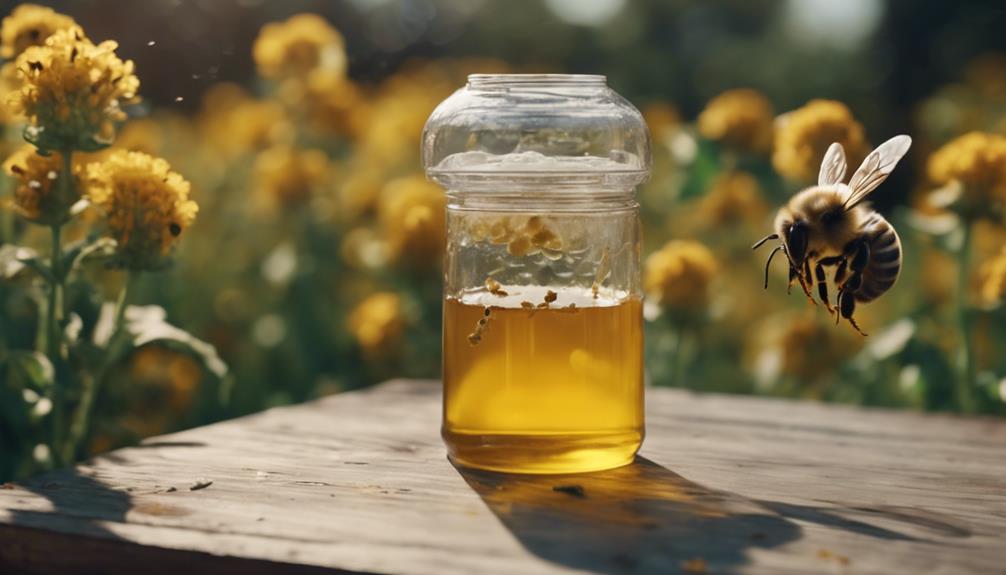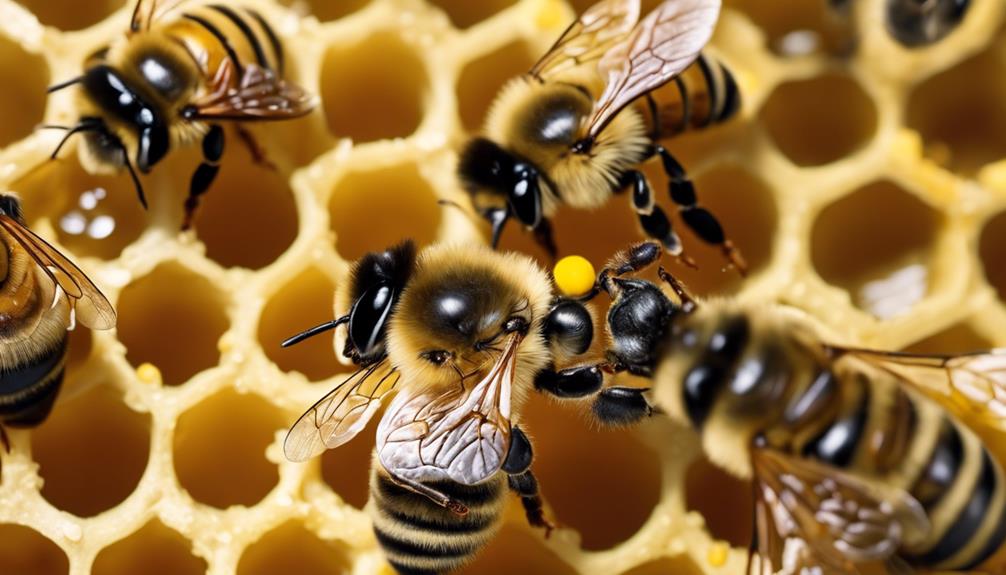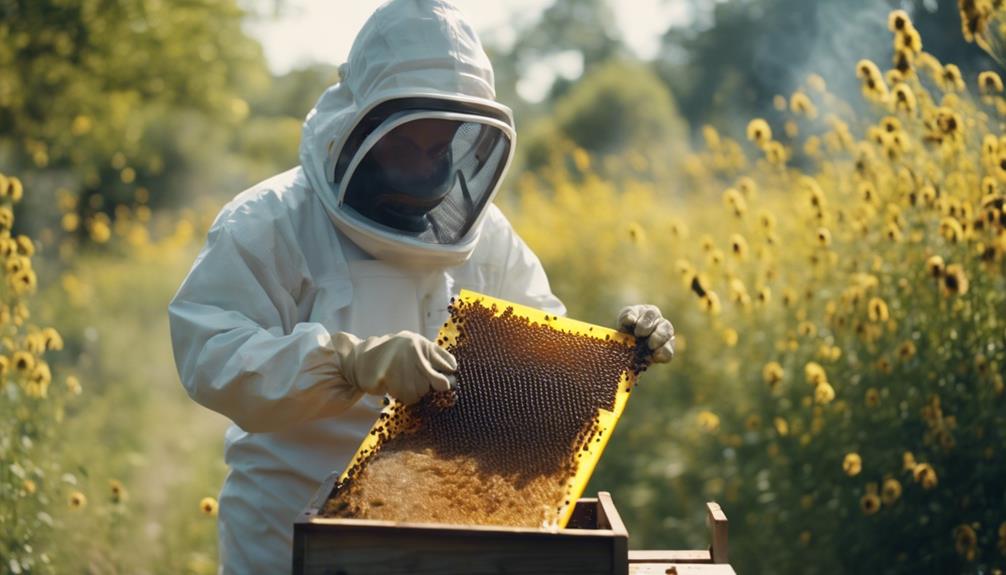We oppose beekeeping due to ethical concerns like artificial insemination of queen bees and inhumane treatment in commercial beekeeping, prioritizing respect for all creatures. Bee well-being is crucial, questioning practices such as wing clipping and disease control methods. The industry’s focus on efficiency over bee welfare raises red flags, indicating a need for ethical treatment in honey production. Bees are not mere commodities and deserve care in their environments. Further details illuminate our stance’s depth and convictions.
Main Points
- PETA opposes beekeeping due to ethical concerns like artificial insemination of queen bees.
- Inhumane treatment of bees in commercial beekeeping conflicts with respecting all creatures.
- Practices such as wing clipping and burning diseased bees are questioned by PETA.
- Beekeeping practices often prioritize convenience over the well-being of essential pollinators.
- Bees play a vital role in the ecosystem and deserve care and respect.
Ethical Concerns With Beekeeping
PETA opposes beekeeping due to ethical concerns surrounding practices like artificial insemination of queen bees. The inhumane treatment of bees in commercial beekeeping goes against our principles of respecting all creatures, including bees.
We question the necessity of procedures like clipping queen bees’ wings or burning diseased bees, as these practices seem to prioritize convenience over the well-being of these essential pollinators. Bees play a vital role in our ecosystem, and it’s our responsibility to make sure they’re treated with care and respect.
Exploitation of Bees in Industry
We oppose the exploitation of bees in the industry due to concerns about their welfare. Practices like artificial insemination and factory-farming raise ethical red flags for us.
Ensuring the ethical treatment of bees in commercial honey production is essential for their well-being.
Bee Welfare Concerns
Amid concerns about bee welfare in the industry, practices such as artificial insemination of queen bees and clipping their wings are viewed as exploitative by critics like PETA. These methods are often used in honey production, where efficiency is prioritized over the well-being of the bees.
Artificial insemination of queen bees and wing clipping are common practices in beekeeping, especially in larger operations. However, PETA raises valid points about the ethical implications of these actions. Beekeepers sometimes clip queen bees’ wings to prevent them from leaving, which can be distressing for the bees.
Additionally, the use of bodyguard bees that protect the queen in new colonies highlights another aspect of exploitation that PETA is concerned about in the beekeeping industry.
Commercial Honey Production
Concerns surrounding the exploitation of bees in the commercial honey production industry have sparked ethical debates regarding practices such as artificial insemination of queens and wing clipping. When bees are treated as mere commodities in factory-farming settings, it raises important questions about their well-being.
- Bees may undergo artificial insemination, disrupting their natural reproductive processes.
- Clipping the wings of bees can hinder their ability to fly and navigate, limiting their freedom.
- Factory-farming practices often prioritize honey extraction over the ethical treatment of bee colonies.
- The intensive nature of commercial honey production can contribute to issues like colony collapse, impacting bee populations and biodiversity.
Ethical Treatment of Bees
PETA objects to the exploitation of bees in the industry, particularly highlighting concerns about artificial insemination of queen bees. The mistreatment of bees in commercial operations, like clipping queen bees’ wings or causing harm during handling, raises ethical issues.
PETA emphasizes the welfare of bees, even questioning practices such as killing bodyguard bees in new colonies. The organization’s stance on beekeeping underscores the need for ethical treatment throughout the industry.
Alternatives to Traditional Beekeeping
Exploring alternative sweeteners to honey is a pivotal aspect of shifting away from conventional beekeeping practices. When considering honey alternatives, there are several bee-friendly options available that can satisfy your sweet tooth:
- Rice syrup, molasses, sorghum, and other sweeteners can effectively replace honey in recipes.
- Maple syrup and organic cane sugar are viable bee-free options for sweetening.
- Dried fruit or fruit concentrates serve as suitable honey substitutes.
- Choosing honey-free sweeteners not only offers a variety of flavors but also supports bee conservation efforts.
PETAs Stance on Beekeeping Practices
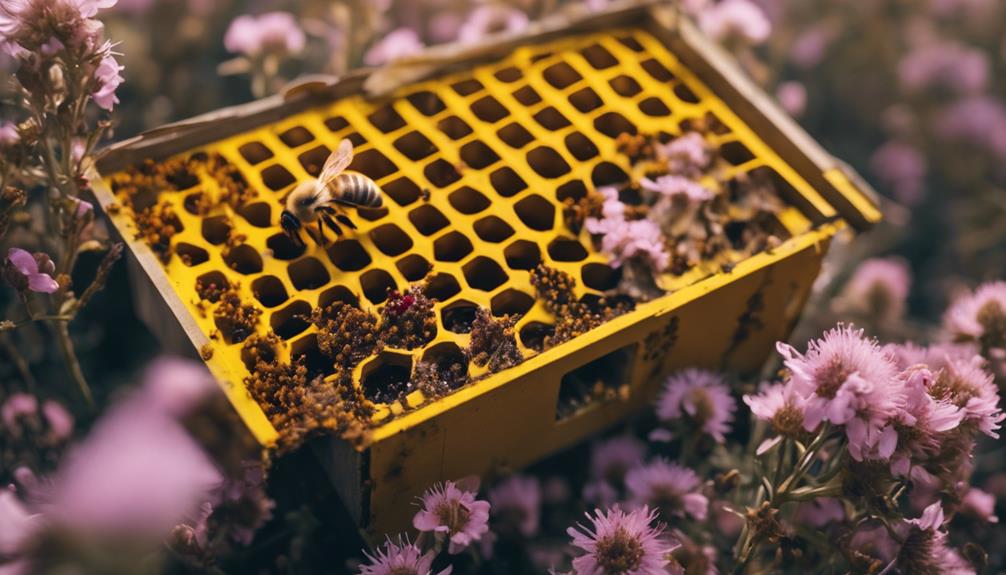
We all know that PETA takes animal welfare seriously.
Regarding beekeeping practices, PETA raises ethical concerns about artificial insemination and wing clipping.
Their critique aims to illuminate the treatment of bees in commercial honey production.
Ethical Concerns in Beekeeping
Highlighting ethical concerns in beekeeping practices, the treatment of queen bees and other bee-related procedures come under scrutiny by PETA for their perceived exploitation of these insects. PETA criticizes practices like artificial insemination of queen bees, clipping wings, and killing bees during handling.
Concerns raised include the ethical treatment of these insects and the welfare implications of such practices. By opposing these inhumane practices, PETA advocates for a more compassionate approach to beekeeping that respects the natural behaviors and needs of bees.
It’s essential to ponder the impact of human actions on all living creatures, including bees, and advocate for practices that prioritize their well-being and autonomy.
Alternatives to Beekeeping
Considering the ethical concerns raised in beekeeping practices, PETA advocates for alternatives that prioritize bee welfare, such as promoting honey-free sweeteners like rice syrup, molasses, and maple syrup. These alternatives not only offer a delicious taste but also support bee conservation efforts endorsed by PETA.
By choosing bee-free sweeteners like dried fruit concentrates over honey, we can contribute to the well-being of these crucial pollinators. While honey has a long history of use, exploring honey-free options aligns with PETA’s stance on bee welfare.
Embracing these alternatives allows us to enjoy sweetness guilt-free, knowing that we’re making choices that benefit bees and their natural habitats. Let’s sweeten our lives while protecting these essential creatures.
Impact of Beekeeping on Bee Populations
How does beekeeping impact bee populations? Here are some key points to take into account:
- Harmful Practices: Artificial insemination and clipping queen bees’ wings in beekeeping can harm bee populations.
- Contribution to Decline: Industrial beekeeping, as highlighted by PETA, is believed to contribute to the decline of bee populations.
- Exploitation and Stress: Bees in commercial beekeeping operations face stress and exploitation, impacting their health and survival.
- Disruption of Natural Behaviors: Beekeeping industry practices may disrupt natural bee behaviors, leading to negative consequences for bee populations.
Understanding these impacts is essential in making informed decisions about beekeeping practices that prioritize the well-being of bees over human interests.
Cruelty Allegations in Commercial Beekeeping
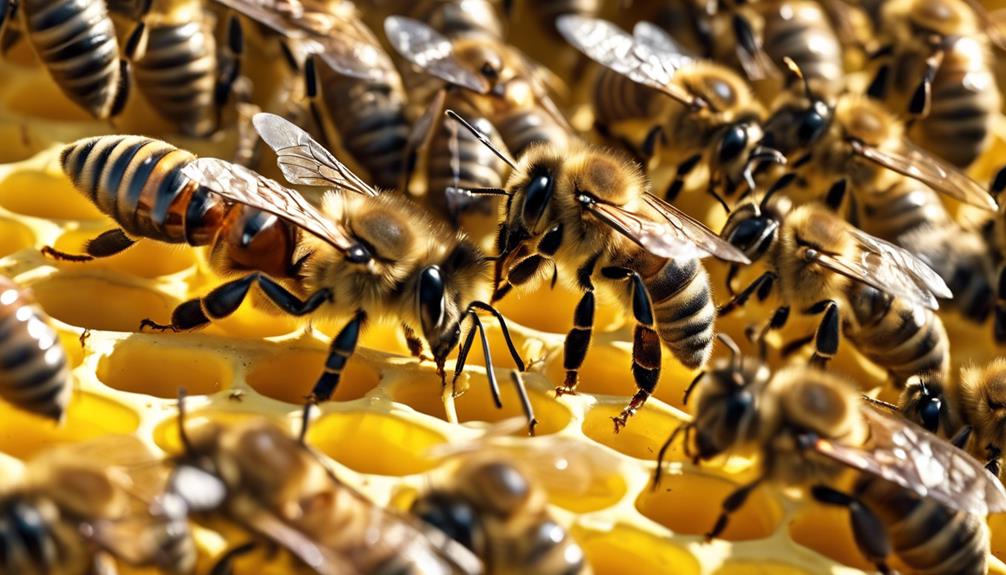
What ethical concerns does PETA raise regarding commercial beekeeping practices?
PETA alleges animal cruelty in commercial beekeeping, pointing fingers at practices like clipping queen bees’ wings and exploiting bees for profit. The accusations extend to honey theft and disrupting natural bee behavior, all underlining perceived violations of animal welfare.
These allegations have sparked debates within vegan and vegetarian circles, drawing attention to the ethical considerations surrounding bee exploitation.
PETA’s stance against commercial beekeeping reflects deep-rooted concerns about the treatment of bees and the impact of these practices on animal welfare. As advocates for ethical treatment of all creatures, PETA’s allegations highlight the darker side of the honey industry and prompt reflection on the boundaries of acceptable practices in commercial beekeeping.

Roger Thomas is a seasoned beekeeper and hive architect with a deep-seated passion for sustainable living. His fascination with bees has shaped his professional career, giving him practical and theoretical expertise in bee behavior, colony health, and optimal hive conditions. Roger’s technical skills shine in his bespoke hive creations that cater to the specific needs of diverse bee species, while his sustainable practices promote environmental balance and the wellbeing of the bee population.
As he continues his journey in beekeeping, Roger has become a dedicated advocate for responsible practices and an insightful educator in his field. His posts aim to inspire new beekeepers, underline the importance of sustainability, and showcase the remarkable contribution bees make to our ecosystem. Roger invites you to join him as he delves into the world of bees and the rewarding, honey-sweet art of beekeeping.
